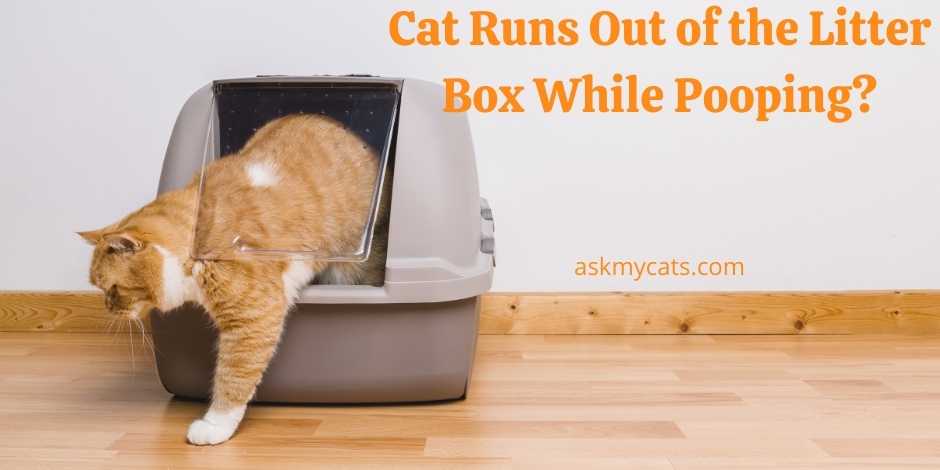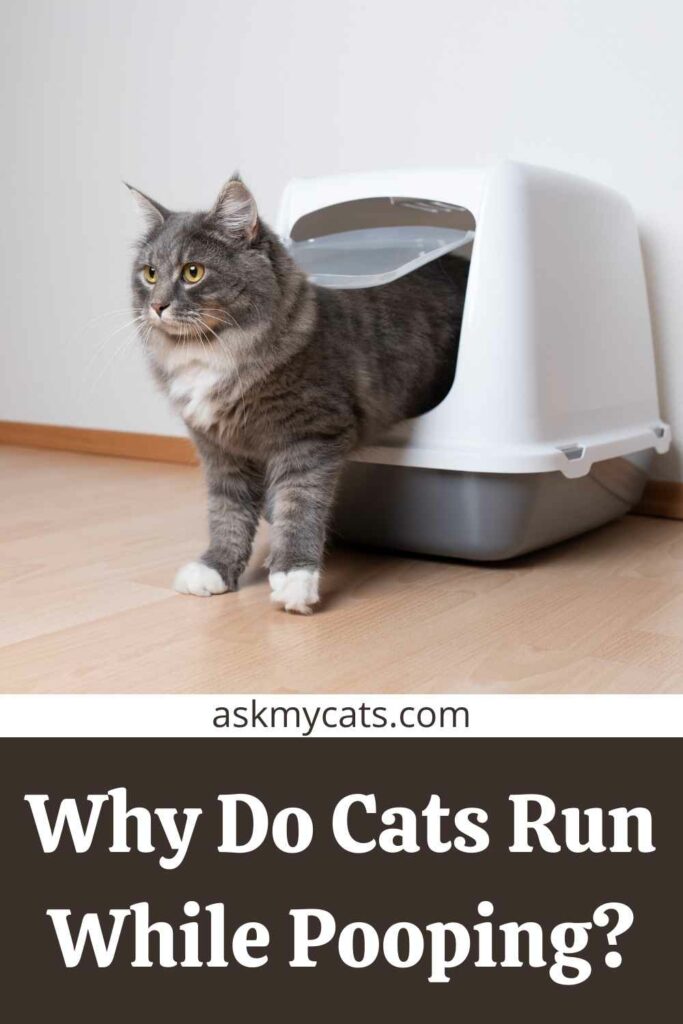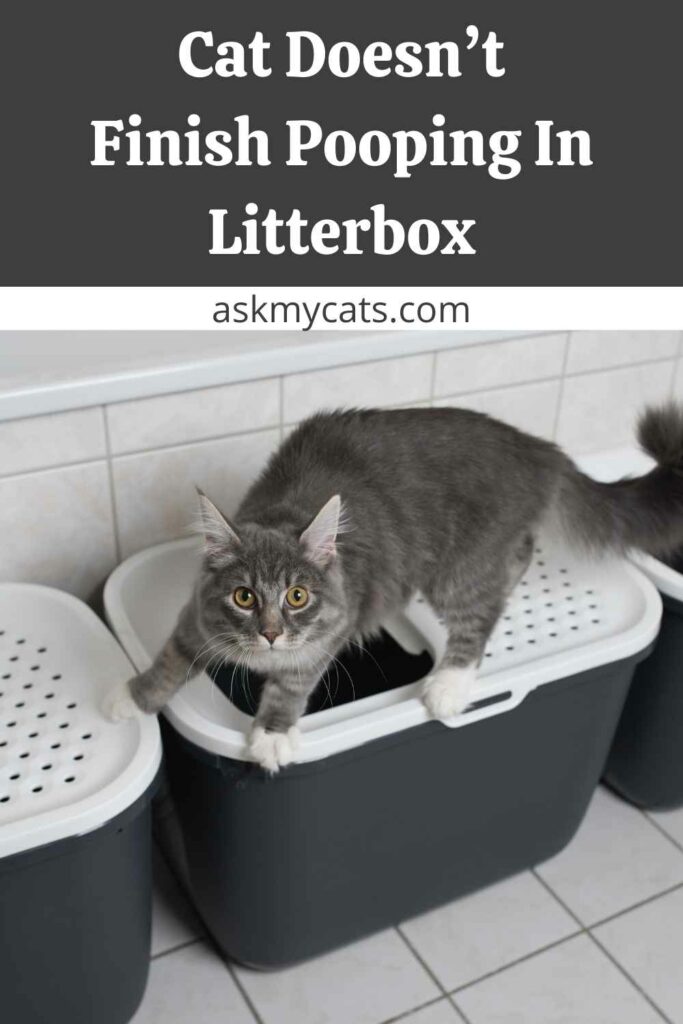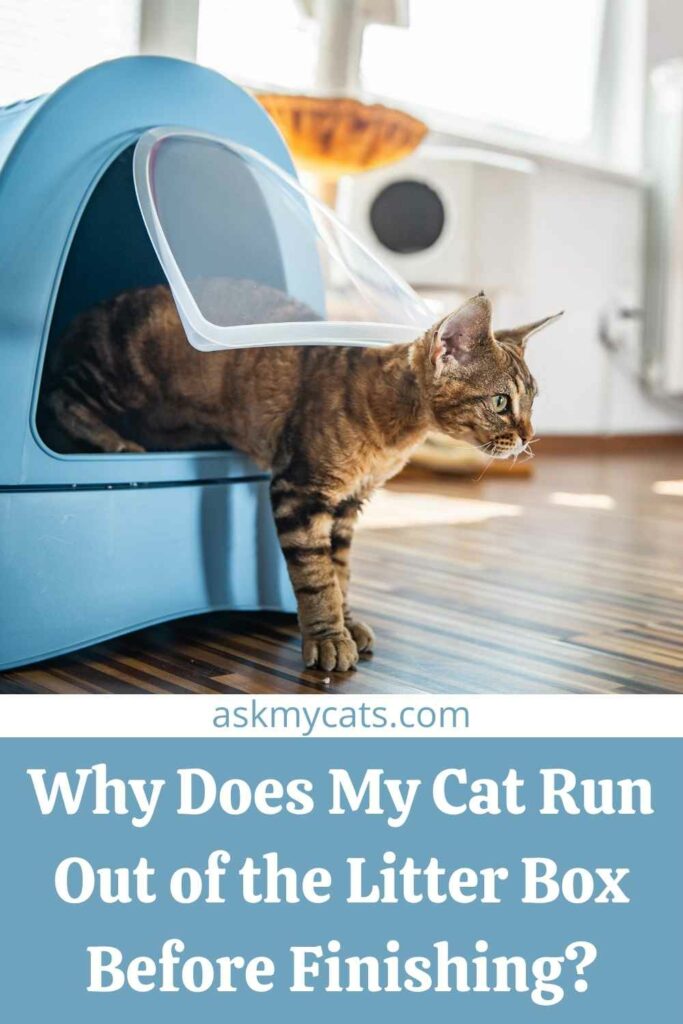Have you ever observed how your cat will go to his litter box, do his business, and then bounce as if he’s being pursued? You’ve undoubtedly questioned what’s up with this strange behavior.
Your cat runs out of the litterbox while pooping because some kind of inflammation or infection in the urinary system, rectum, or colon is troubling your cat.
As a result, it’s a good idea to get your cat inspected by a veterinarian to rule out these issues, especially if your cat is exhibiting other signs of illness.
Below are a few possible explanations to assist you in better understanding your tenacious feline companion.


Give Your Cat the Perfect Day
Get the Free Ebook!
Why Do Cats Run While Pooping?
Cats have a vagus nerve that runs from their brain stem, much like humans. Pooping can activate the nerve, causing your cat to have sensations and desires to run around. As a result, cats may be rushing to expend the excess energy that comes from activating the vagus nerve.

When a cat poops, it activates a nerve in its body, causing them to feel euphoric, which might explain why your cat has the zoomies.
The vagus nerve, which goes from the brain throughout the body, including the digestive tract, is the nerve that is being activated.
The nerve has a variety of activities, including lowering inflammation and influencing stress, anxiety, and terror.
According to some specialists, feces activates the nerve in some way, resulting in a strange feline ‘high’ that cats express with zoomies.
In the wild, a cat’s natural instinct is to stay away from the scent of elimination in order to avoid being attacked by predators.
It could be that he believes he smells another predator’s poop (when it’s his own), or that he believes a predator can smell his poop, so he wants to get as far away from the crime scene as possible.
Even if you don’t think your cat’s feces have a fragrance, it does — which makes his conduct all the more important. We know that cats have a highly developed sense of smell, so what we would consider a faint fragrance could be really irritating to them.
Your cat may flee the litter box because pooping hurts him and he wants to get out of there as quickly as possible.
Cats who have trouble eliminating (for example, constipation) may blame the box. They move away from the site once they’ve finished, probably associating the facilities with the discomfort.
If your cat is constipated, he may struggle to use the litter box or refuse to use it at all. If you detect any of these symptoms, or if your cat hasn’t pooped in more than three days, call your veterinarian right once.
Another reason could be that after emptying the litter box, the cat simply feels so good that he has to run around in a joyful display.
And if your cat is happy, this could make him even happier, leading to the inevitable post-poop zoomies.
Many cats get ‘zoomies’ (crazy-running episodes) in the evening, most likely as a result of naps all day and a need to expend all that pent-up energy. If it happens to fall on the same day as a trip to the litter box, it can become a habit.
Cat Doesn’t Finish Pooping In Litterbox
Your cat doesn’t finish pooping in the litterbox because he finds the litterbox dirty.

When your cat refuses to use the litter box, the reason might be as simple as the litter is too dirty for him. Kittens like to use clean litter boxes, just as adults prefer to use a clean toilet, so keeping your furry friend’s litter box clean is essential.
Examine the litter box the next time your cat rushes out to determine whether it needs to be cleaned or if it needs to be thrown out and replaced with fresh litter.
It’s just one of the simplest things you can do to keep your feline friend happy. It’s also an excellent technique to keep your pet from growing disgusted with the box to the point that he goes to the toilet outside of it, causing a major mess.
If you’ve ever watched a mother cat care for her kittens, you’ll know that she assists them much when it comes to going to the toilet and staying clean.
Another belief holds that, while kittens require their mother’s assistance in cleaning themselves after going to the potty, adult cats seek to show off their independence. In other words, they may try to catch your attention in order to inform you of their accomplishments.
Going to the restroom might bring a sense of relief, especially if you’ve been waiting a long time. It’s possible that cats are in the same boat. It’s possible that your cat hurries out of the litter box because she feels so much better after using it.
In other words, some cats may feel better after using the litter box, and there is a theory that kittens that are relieved would sprint to show off their delight. And, once they’ve expended all of their energy, they might be able to relax right away.
When your cat needs to relieve himself, he may develop the habit of getting out of the litter box as fast as possible. However, if this isn’t your pet’s regular or customary activity, you should look into what he did in the box to determine if he’s having stomach issues.
If you discover that he is exhibiting symptoms, you may take steps to monitor him and help him feel better, possibly with the aid of your veterinarian.
You might also like to know reason behind cat dragging poop out litter box
Why Does My Cat Run Out of the Litter Box Before Finishing?
Your cat runs out of the litterbox before finishing because he is facing pain and discomfort while pooping.

While poop spread around your house may appear to indicate that your cat is pooping while running, this isn’t always the case. In fact, one of the most typical reasons for your cat to flee after pooping is because of this.
When a cat makes a bowel movement, it might become trapped either on the way out or in the surrounding hair. When excrement gets stuck, many cats may try to unstick the issue by sprinting or hopping around, creating the appearance of running while pooping.
A bowel movement might become stuck due to diarrhea or constipation. Stickiness is also prone to longer human hair or other undigested particles in the feces. Softer feces, in particular, tend to become trapped in the fur of long-haired cats.
If your cat is running while pooping, on the other hand, it might be a sign of a health condition. Bowel inflammation, gastrointestinal parasites, and infections are just a few of the medical disorders that might make your cat defecate in agony.
This discomfort or suffering may force your cat to flee during the deed.
If you suspect this is the case, or if you have any doubts, call your veterinarian right once. The earlier health issues are identified, the more easily they may be treated.
According to some experts, when kittens defecate, their mothers usually assist them in cleaning up. Adult cats may be proudly displaying their independence by removing themselves from the litter box without help.
Cats in the wild are preyed upon by a variety of predators. They are especially vulnerable while voiding. Predators may detect the fragrance of excrement as a sign that prey is close. It’s understandable that they’d want to leave the area as soon as they’ve pooped.
It’s possible that cats feel better after defecating. In the anus, there are vagus nerve terminals that, when activated, can generate sensations of euphoria for a short time. Maybe it’s just a natural sensation of relief after dealing with a moderately unpleasant scenario.
Defecating is more unpleasant when the feces are loose or constipated, even if it is not “sticky.” Your cat might want to get away from the situation right away.
Consult your veterinarian if your cat has regular constipation or diarrhea. It might indicate a more significant health issue.
Your cat may want to leave the litter box as soon as possible if it is dirty. Cleaning the litter box on a regular basis is essential for our cats’ comfort. Scooping the solids on a daily basis would be a better job. Sift the pellets once a day.
Once a week, completely replace the clay litter. Several times each month, clean the box with water and a light detergent.
Plastic litter boxes should be updated every six months or so since plastic absorbs smells.
A rapid departure may also be necessary if the litter box is located in a high-traffic or otherwise stressful environment. Try relocating the litter box to a more tranquil location.
You might like to know why do cats run after they poop
Why Is My Cat Running Around While Pooping?
Cat runs around while pooping because he can’t stand the smell of his own poop.
The cat does its business and quickly flees the stench, believing that the rush of air through its fur would wash away any lingering odors.
While it is to be agreed that the poop stinks like nothing else and would make anyone want to flee. It doesn’t appear as the cat enjoys tearing through the home enough to be an escape.
If your cat has never done this before and suddenly begins, there may be a problem, especially if the cat stops using the litter box for excrement. Cause-and-effect is everything to cats. If they have pain after using the litter box, they blame it on the litter box.
In such a situation, your cat may be in agony, necessitating a trip to the veterinarian. However, in the great majority of situations, the cat is OK and is simply enjoying the basic, though stinky, pleasures of life.
How Do I Stop My Cat From Running Out Of The Litterbox?
To stop your cat from running out of the litterbox you have to fix your cat’s litter box issues.
Cats are famously picky, and many may refuse to use a litter box that isn’t spotless.
You should have one more litter box than there are cats in your household. This implies that if you have one cat, you’ll need two litter boxes; if you have two cats, you’ll need three. The litter boxes should also be set far enough apart so the cat can only see the one it is using.
If you find that your cat has a litter box problem, you should be able to put an end to any feces tracking.
Frequently Asked Questions
Why does my cat run out of the litter box after peeing?
It’s been reported that cats like a clean environment for pooping, similar to how some people prefer to flush before going so they may discharge in a clean bowl. It’s possible that darting out of the litter box after going is their way of avoiding the filth at breakneck speed.
Why do cats sprint after pooping?
When a cat poops, it triggers a nerve in their body that causes them to feel euphoric, which might explain why your cat gets the zoomies. The nerve being activated is known as the vagus nerve, and it goes from the brain throughout the body, including the whole digestive system.
Why is my cat suddenly pooping outside the litter box?
Your cat may be having litter box issues for a variety of reasons, including medical issues, an aversion to the litter box, or a propensity for peeing or defecating in locations other than the litter box. House soiling can be caused by a dislike for the litter box.
Final Words
Try to figure out if your cat is running while defecating or afterward if they’re dragging excrement throughout the home. Frequently, they’ve completed their business and are attempting to remove a clogged bowel movement.
Contact your veterinarian right away if they are running while defecating or just going outside the litter box. It might indicate a major health issue. It’s probably nothing to be concerned about if your cat runs away from the litter box after pooping.
Leave your questions in the comments section below.
